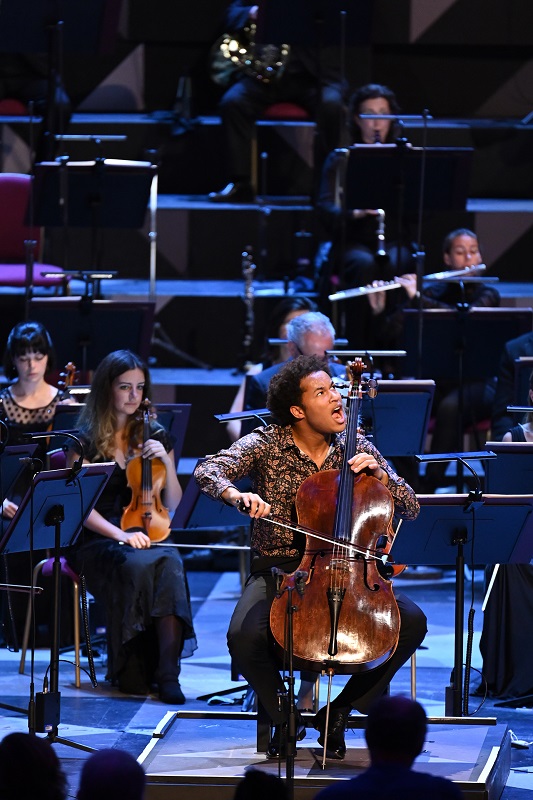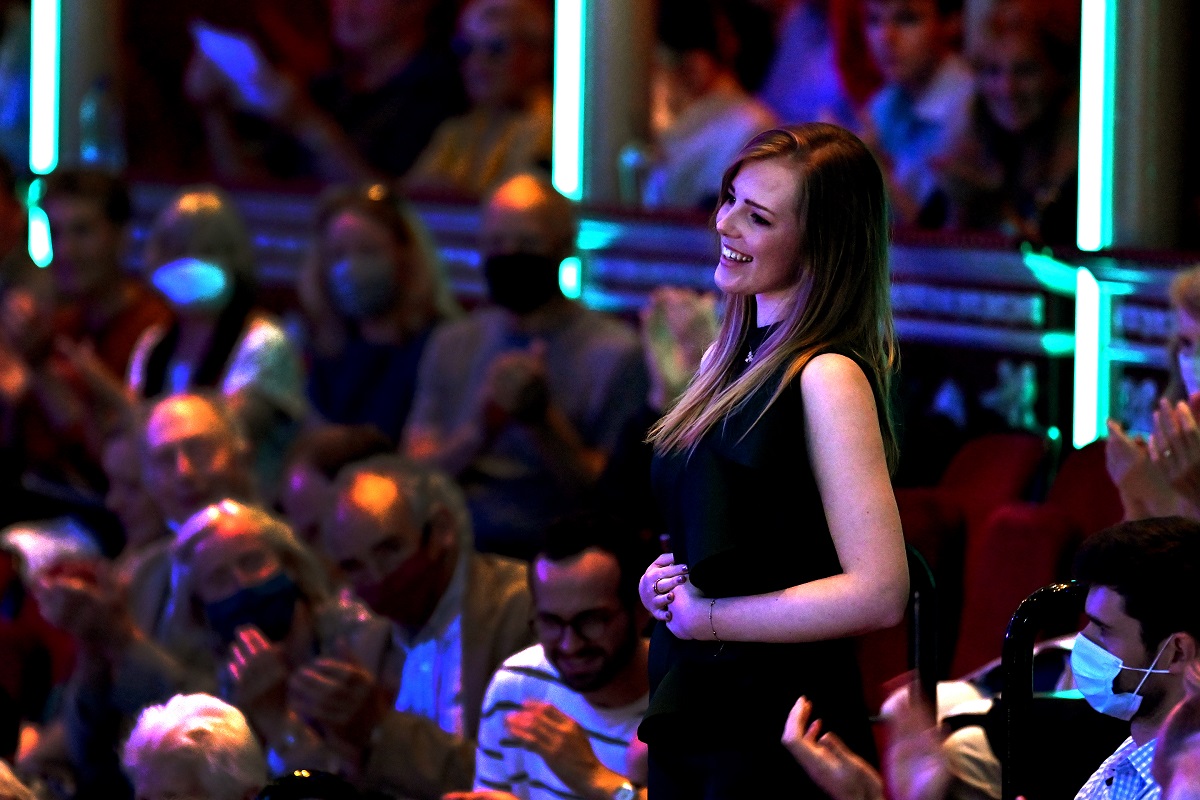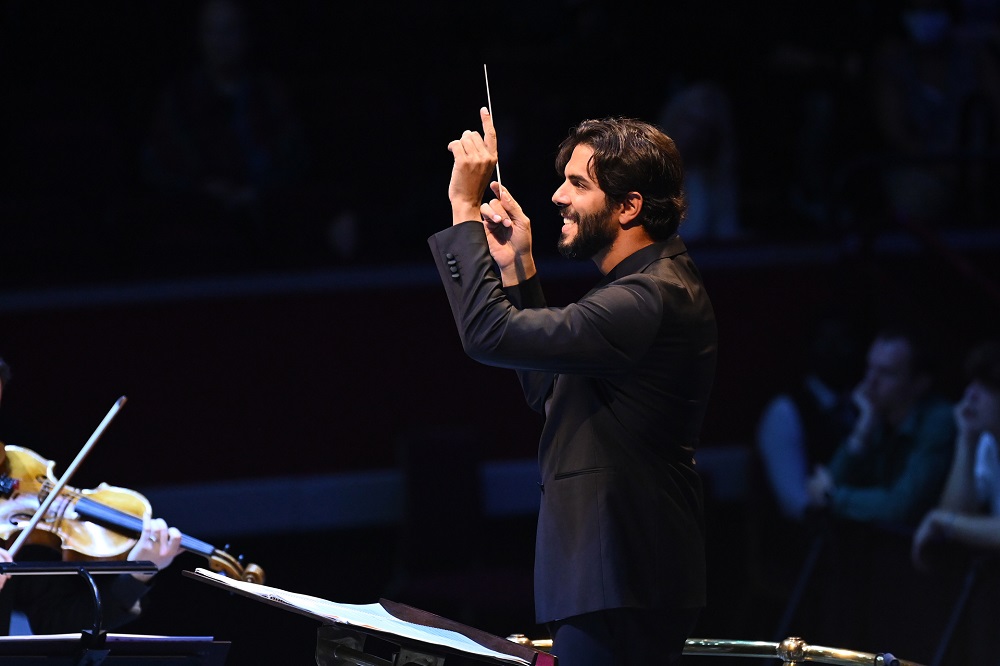Sheku Kanneh-Mason, RLPO, Hindoyan, BBC Proms review - wood magic and swashbuckling show-offs | reviews, news & interviews
Sheku Kanneh-Mason, RLPO, Hindoyan, BBC Proms review - wood magic and swashbuckling show-offs
Sheku Kanneh-Mason, RLPO, Hindoyan, BBC Proms review - wood magic and swashbuckling show-offs
The cellist meditates, the Liverpudlian orchestra lets rip with its lively new chief conductor
After 14 years as principal conductor, Vasily Petrenko has left the Royal Liverpool Philharmonic Orchestra in top-league shape. The players must be as thrilled as we are that his successor, Venezuelan Armenian Domingo Hindoyan, carries the flame, catches the spark, call it what you will, with a distinct personality of his own, combining clariy and elegance in baton-wielding with a very watchable physical freedom.
Kanneh-Mason’s interpretation of the Dvořák Cello Concerto (pictured below) certainly doesn’t play to the gallery, and in terms of the capricious venue, that had drawbacks as well as subtle advantages. When, nearly a year ago, I heard his first try-out, in a rather beguiling chamber-orchestra arrangement by George Morton played by expert young musicians of the Fantasia Orchestra, the very spaced-out audience were close to the players, albeit in a reverberant church (St Mary Abbots Kensington). It felt intensely passionate, still a bit rough around the edges.
 Apart from a tiny bit of over-urged double stopping which sent the usually reliable pitch awry, the Proms performance seemed, from a seat to the side where you admittedly lose a lot of the sound that’s going out front, contained, very sophisticated indeed in solo transitions, suitably lonely and plaintive as the first-movement development leaves the cellist lost in the twilight, above all very fine-tuned to the woodwind solos who share the limelight with the soloist as much as in the late Mozart piano concertos. The encore was perfect in context: an evanescent use of the pizzicato Dvorak avoids in his own transcendental homage to Bacharach and Aretha Franklin, seemingly improvising on “I Say a Little Prayer" (though no doubt it was all notated). As so often, the magic of the hall comes into its own when you hear a great soloist intimately communing on his or her own with thousands.
Apart from a tiny bit of over-urged double stopping which sent the usually reliable pitch awry, the Proms performance seemed, from a seat to the side where you admittedly lose a lot of the sound that’s going out front, contained, very sophisticated indeed in solo transitions, suitably lonely and plaintive as the first-movement development leaves the cellist lost in the twilight, above all very fine-tuned to the woodwind solos who share the limelight with the soloist as much as in the late Mozart piano concertos. The encore was perfect in context: an evanescent use of the pizzicato Dvorak avoids in his own transcendental homage to Bacharach and Aretha Franklin, seemingly improvising on “I Say a Little Prayer" (though no doubt it was all notated). As so often, the magic of the hall comes into its own when you hear a great soloist intimately communing on his or her own with thousands.
More than ever, the Dvořák felt like a Symphony-Concerto, with equal glories going to the woodwind, projecting so well into the hall, and one of the noblest-toned horn ensembles that’s ever graced the Proms – principal Timothy Jackson got us off to a dreamy start within the orchestral introduction. Vivid images of a wooded landscape with birdsong were inescapable, prompted, surely, by the sylvan magic of the opening commission shared by the BBC and the RLPO, Grace-Evangeline Mason’s The Imagined Forest (the composer pictured below). It certainly turned me to look at the often fascinating nature-collages of Clare Celeste Börsch, Mason’s inspiration. Had it stayed static, you might have labelled The Imagined Forest superior music for a Living Planet documentary. But Mason knows how to move symphonically, and there’s even an organically-evolved dance sequence before the music shifts back to its opening trumpet note (a relief in itself not to be greeted by an initial percussion splatter, even if the tubular bells are still in the score). I certainly want to hear more of this composer.  Nevertheless glittering mastery of orchestral possibilities only truly hit us in the second half. The swashbuckling adventures of Strauss’s Don Juan immediately tell us if the conductor has both the fire and the flexibility for late-romantic repertoire, and that was absolutely the case with Hindoyan, sheddling new light especially on carnival japes shortly after the midway arrival of the great theme for horns. Perfect poise from principal oboist Jonathan Small in what Strauss tells us is the one deeper love of the libertine’s life was shadowed by exquisitely delicate muted strings and horns.
Nevertheless glittering mastery of orchestral possibilities only truly hit us in the second half. The swashbuckling adventures of Strauss’s Don Juan immediately tell us if the conductor has both the fire and the flexibility for late-romantic repertoire, and that was absolutely the case with Hindoyan, sheddling new light especially on carnival japes shortly after the midway arrival of the great theme for horns. Perfect poise from principal oboist Jonathan Small in what Strauss tells us is the one deeper love of the libertine’s life was shadowed by exquisitely delicate muted strings and horns.
Flautist Cormac Henry was the soloist-star in Hindemith’s Symphonic Metamorphosis on Themes by Carl Maria von Weber, in a dreamy descant to a wistful theme, respite among otherwise racy and sharp-edged ripostes to Strauss’s luxury horse composed 54 years earlier. Hindemith’s orchestra is big, all the same – lucky this second half was programmed at a time when mid-range orchestral pieces had to be the order of the day – and the percussion get to shine as much as any other department; the RLPO’s new bells of the non-tubular variety were duly applauded at the end.  Hindoyan’s racy but always focused energy propelled the three marches, and caught the humour of the riffs on Weber’s pentatonic Chinese melody of the Turandot fantasy (re-used bythe original composer in his music for the Gozzi play that also inspired Puccini and Busoni in two very different operas). The Strauss of Till Eulenspiegel must have applauded Hindemith’s ability to make us laugh out loud. What a great concert for the packed audience of all ages, especially the young who aren’t so often in evidence at the Proms; if only it could have been televised as well.
Hindoyan’s racy but always focused energy propelled the three marches, and caught the humour of the riffs on Weber’s pentatonic Chinese melody of the Turandot fantasy (re-used bythe original composer in his music for the Gozzi play that also inspired Puccini and Busoni in two very different operas). The Strauss of Till Eulenspiegel must have applauded Hindemith’s ability to make us laugh out loud. What a great concert for the packed audience of all ages, especially the young who aren’t so often in evidence at the Proms; if only it could have been televised as well.
rating
Share this article
Add comment
The future of Arts Journalism
You can stop theartsdesk.com closing!
We urgently need financing to survive. Our fundraising drive has thus far raised £49,000 but we need to reach £100,000 or we will be forced to close. Please contribute here: https://gofund.me/c3f6033d
And if you can forward this information to anyone who might assist, we’d be grateful.

Subscribe to theartsdesk.com
Thank you for continuing to read our work on theartsdesk.com. For unlimited access to every article in its entirety, including our archive of more than 15,000 pieces, we're asking for £5 per month or £40 per year. We feel it's a very good deal, and hope you do too.
To take a subscription now simply click here.
And if you're looking for that extra gift for a friend or family member, why not treat them to a theartsdesk.com gift subscription?
more Classical music
 Jansen, LSO, Pappano, Barbican review - profound and bracing emotional workouts
Great soloist, conductor and orchestra take Britten and Shostakovich to the edge
Jansen, LSO, Pappano, Barbican review - profound and bracing emotional workouts
Great soloist, conductor and orchestra take Britten and Shostakovich to the edge
 Jakub Hrůša and Friends in Concert, Royal Opera review - fleshcreep in two uneven halves
Bartók kept short, and a sprawling Dvořák choral ballad done as well as it could be
Jakub Hrůša and Friends in Concert, Royal Opera review - fleshcreep in two uneven halves
Bartók kept short, and a sprawling Dvořák choral ballad done as well as it could be
 Hadelich, BBC Philharmonic, Storgårds, Bridgewater Hall, Manchester review - youth, fate and pain
Prokofiev in the hands of a fine violinist has surely never sounded better
Hadelich, BBC Philharmonic, Storgårds, Bridgewater Hall, Manchester review - youth, fate and pain
Prokofiev in the hands of a fine violinist has surely never sounded better
 Monteverdi Choir, ORR, Heras-Casado, St Martin-in-the-Fields review - flames of joy and sorrow
First-rate soloists, choir and orchestra unite in a blazing Mozart Requiem
Monteverdi Choir, ORR, Heras-Casado, St Martin-in-the-Fields review - flames of joy and sorrow
First-rate soloists, choir and orchestra unite in a blazing Mozart Requiem
 Cho, LSO, Pappano, Barbican review - finely-focused stormy weather
Chameleonic Seong-Jin Cho is a match for the fine-tuning of the LSO’s Chief Conductor
Cho, LSO, Pappano, Barbican review - finely-focused stormy weather
Chameleonic Seong-Jin Cho is a match for the fine-tuning of the LSO’s Chief Conductor
 Classical CDs: Shrouds, silhouettes and superstition
Cello concertos, choral collections and a stunning tribute to a contemporary giant
Classical CDs: Shrouds, silhouettes and superstition
Cello concertos, choral collections and a stunning tribute to a contemporary giant
 Appl, Levickis, Wigmore Hall review - fun to the fore in cabaret and show songs
A relaxed evening of light-hearted fare, with the accordion offering unusual colours
Appl, Levickis, Wigmore Hall review - fun to the fore in cabaret and show songs
A relaxed evening of light-hearted fare, with the accordion offering unusual colours
 Lammermuir Festival 2025, Part 2 review - from the soaringly sublime to the zoologically ridiculous
Bigger than ever, and the quality remains astonishingly high
Lammermuir Festival 2025, Part 2 review - from the soaringly sublime to the zoologically ridiculous
Bigger than ever, and the quality remains astonishingly high
 BBC Proms: Ehnes, Sinfonia of London, Wilson review - aspects of love
Sensuous Ravel, and bittersweet Bernstein, on an amorous evening
BBC Proms: Ehnes, Sinfonia of London, Wilson review - aspects of love
Sensuous Ravel, and bittersweet Bernstein, on an amorous evening
 Presteigne Festival 2025 review - new music is centre stage in the Welsh Marches
Music by 30 living composers, with Eleanor Alberga topping the bill
Presteigne Festival 2025 review - new music is centre stage in the Welsh Marches
Music by 30 living composers, with Eleanor Alberga topping the bill
 Lammermuir Festival 2025 review - music with soul from the heart of East Lothian
Baroque splendour, and chamber-ensemble drama, amid history-haunted lands
Lammermuir Festival 2025 review - music with soul from the heart of East Lothian
Baroque splendour, and chamber-ensemble drama, amid history-haunted lands
 BBC Proms: Steinbacher, RPO, Petrenko / Sternath, BBCSO, Oramo review - double-bill mixed bag
Young pianist shines in Grieg but Bliss’s portentous cantata disappoints
BBC Proms: Steinbacher, RPO, Petrenko / Sternath, BBCSO, Oramo review - double-bill mixed bag
Young pianist shines in Grieg but Bliss’s portentous cantata disappoints

Comments
Hi! Just read your very nice
Many thanks, James - worth
Many thanks, James - worth getting it right indeed (forgive poor sight in scouring the players' list in the programme). Duly corrected.